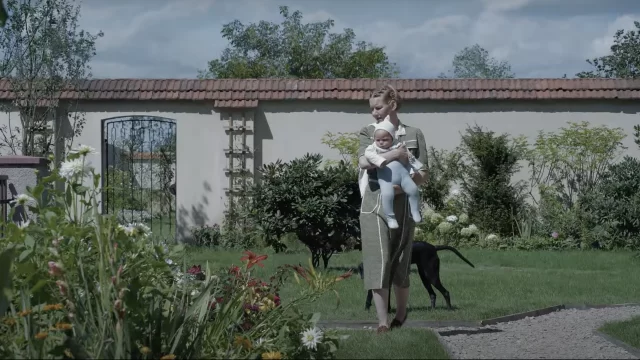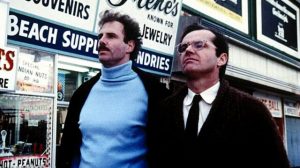
The post The Zone of Interest: Distanced Lives, Absent Voices, by Scott Nye appeared first on Battleship Pretension.
Jonathan Glazer’s fourth film, The Zone of Interest, is almost literally a museum piece. Shot in a house on the grounds of Auschwitz, on the outskirts of the camp, it depicts the domestic life of real-life figure Rudolph Höss, the Nazi commandant of the death factory. Höss wasn’t just a bureaucrat; he was an ambitious soldier who first established the camp, and designed and continued to refine the methods and processes by which prisoners could be murdered most efficiently. The film is distantly concerned with his crimes, but only as an extension of his home life. Like anyone else, Höss (played here by Christian Friedel) has a career he’s trying to build that will provide the best possible life for his family.
Family life is largely overseen by his wife Hedwig (Sandra Hüller), who regards their house as a paradise. There are suggestions, most directly when Hedwig’s mother comes to visit, that they come from a working-class background. Consequently, life in a large house with servants and a garden, near a river, is well beyond what they could have hoped for growing up. They’re desperate to hold onto it and savor its luxury.
They are so attached to it that they have little moral or psychological trouble living in idyll despite the screams and sounds of the death machine happening just on the other side of their garden wall. Without ever taking us there visually, Glazer and sound designer Johnnie Burn, incorporating a score by Mica Levi, create the understanding of living next door to horror, and the steely mindset required to not only ignore it, but somewhat relish it. When the possibility is raised that the Nazi leadership might move them out of the country and back to Berlin, Hedwig is indignant. She seizes on the country living, but the relish with which she lords her status – regularly denigrating the servants, at one point calling herself the Queen of Auschwitz – suggests the proximity to the camp is of equal vitality for her.
The film is more inspired by than adapted from a 2014 novel of the same name by Martin Amis, which I have not read but, based on the outline, has much more overt melodrama than Glazer is interested in. Even the plot synopses available online suggest an inner life to the characters the film conveniently shoves aside.
“The banality of evil” is a tough thing to depict, as it runs the risk of simply becoming banal. The chief problem here is that Höss himself was not, even at a cursory glance, a banal figure at all. He was a terrorist before he joined the Nazi party in 1922, when it was just a few thousand strong, in the process renouncing the strong Catholic upbringing of his youth. . He beat a man to death soon after and was sent to prison for ten years, serving four. As an SS officer at Dachau, he led a firing squad and personally performed the first execution of a conscientious objector during World War II. While overseeing Auschwitz, he had a sexual relationship with a prisoner and impregnated her. His rise through Nazi ranks relied on his ruthless determination.
In his autobiography, written during his imprisonment after the war (he was shortly thereafter executed, in 1947), he expresses a great deal of feeling in several directions behind his work. He claims he was torn between his innate sympathy for prisoners, having been one himself, only to immediately note “I was convinced of the need for a concentration camp. True opponents of the state had to be locked up; and asocials and professional criminals, who under the law as it then stood could not be imprisoned, must be deprived of their freedom in order to safeguard the rest of the people from their evil deeds. I was also convinced that this task could only be carried out by the SS in their capacity as the guardians of the new state.” To say the further pages are filled with antisemitic diatribes would be an understatement. Like many Nazis after the war, he claims discomfort with what he was ordered to do but little hesitation to do it. He speaks repeatedly, with a sense of honor, of his conviction in personally carrying out orders most in his position would delegate down, insisting that no officer should relay orders he would not perform himself.
The Zone of Interest nods towards the turmoil he felt and the chaos he bred, but only really towards the end. A too-late coda suggests what we know from history: that he is pursuing perfection in a career that will destroy him, and history will regard his work as the ultimate evil. Little of the film, however, interrogates further than that. Too much of its running time is spent circling the central question it establishes within minutes and does little to complicate or magnify. Once we understand that they’re content to set up their domestic life alongside mass genocide, we spend ninety minutes simply watching them do so, shutting out a massive part of Höss’s life – witnessing and performing hundreds, if not thousands, of murders on a near-daily basis.
The film’s aesthetic approach is key to its shortcomings – the film was shot mostly using hidden cameras around the house and letting the actors wander, sometimes for hours, through scenes both scripted and improvised. The camera set-ups are designed to capture as much action in a frame as possible, with few close-ups or angles designed to elicit emotion or provide an authorial perspective on what it depicts. This is meant, I suppose, to suggest a degree of remove for either the audience or the film’s subjects, neither of which benefit from it. The audience isn’t given a window into the characters’ psychology, and the subjects were not actually as dispassionate as such a window suggests. Further, it seeks to remove the director from the equation (Glazer spent little time with the actors on set, instead surveying the action from a video village away from the house) – he is simply “recording” “history.”
But it is a manufactured history he is narrowing for a very particular purpose that, in the process, drifts past the events he is reckoning with. He is in a way like his own vision of Höss, wandering his house at night, double checking the locks and windows to ensure the events outside will not come to bear on his castle. The film has a hypnotic effect that is compelling in a vacuum, with occasional abstract aesthetic flourishes and the grinding score, but it aestheticizes trauma. What truth is conveyed by creating banality where history has recorded ardor? What of the Holocaust is now better understood, interrogated, or revealed by doing so? I don’t mind the film not answering these questions. I do mind it not raising them.
The post The Zone of Interest: Distanced Lives, Absent Voices, by Scott Nye first appeared on Battleship Pretension.
The post The Zone of Interest: Distanced Lives, Absent Voices, by Scott Nye appeared first on Battleship Pretension.
![The Last Letter From Your Lover [2021] ★★](https://recognizecity.com/wp-content/uploads/2021/07/The-last-letter-from-your-lover-netflix-scaled-1-e1626786231353-300x177.webp)


